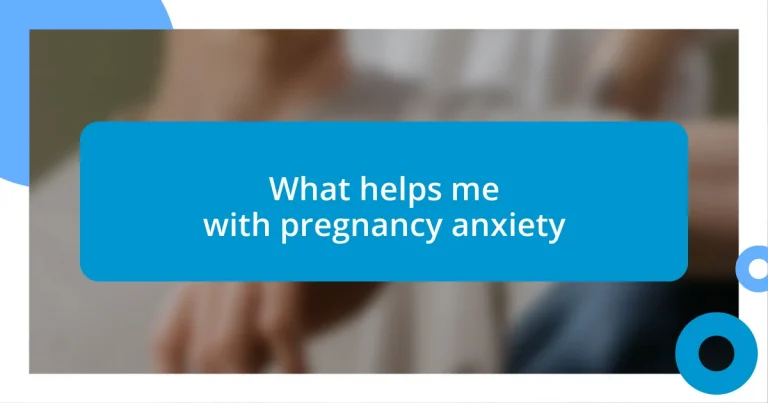Key takeaways:
- Pregnancy anxiety is common among expectant mothers, often stemming from emotional and hormonal changes, and can present through persistent worry, physical symptoms, and social withdrawal.
- Effective coping strategies, such as mindfulness, physical activity, and connecting with support networks, can significantly alleviate anxiety during pregnancy.
- Recognizing when to seek professional help is crucial, especially if anxiety disrupts daily life or manifests through physical symptoms like insomnia and panic attacks.
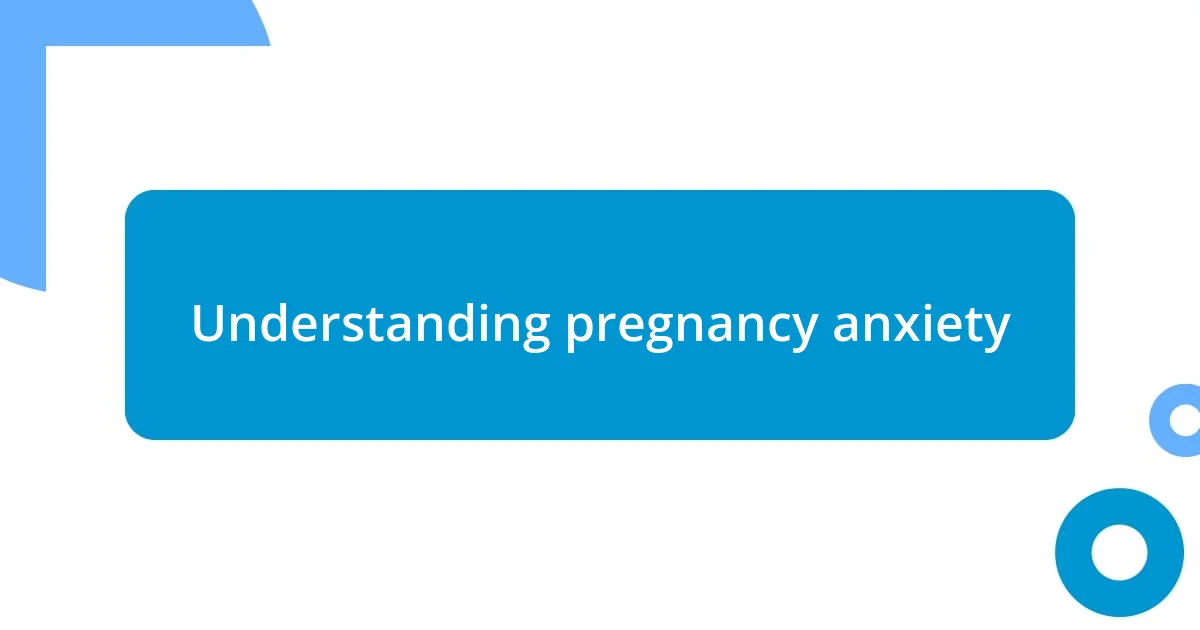
Understanding pregnancy anxiety
Pregnancy anxiety can often feel like a wave crashing in unexpectedly, leaving you breathless. I remember the first time I felt that tightening in my chest, worrying about everything from labor to the health of my baby. It’s not just a passing feeling; it’s a complex mix of emotions, fears, and societal pressures that can leave you questioning if you’re ready for this major life change.
It’s fascinating how anxiety can manifest in different ways during pregnancy. For me, it sparked endless ‘what if’ scenarios that played on repeat in my mind. Have you ever noticed how, at times, you can get stuck in a cycle of worry? Understanding that this is common among expectant mothers helped me realize I wasn’t alone in my experiences, and that solace can sometimes be found in shared stories.
What I found truly insightful was how pregnancy anxiety isn’t just about worrying; it often stems from heightened sensitivity to stress and change. I often thought, “Why do I feel so anxious when I should be excited?” Realizing that hormonal changes play a significant role in our emotional landscape can be comforting, providing a bit of clarity amidst the chaos. It’s important to acknowledge that feeling anxious doesn’t make you a bad parent—it makes you human.
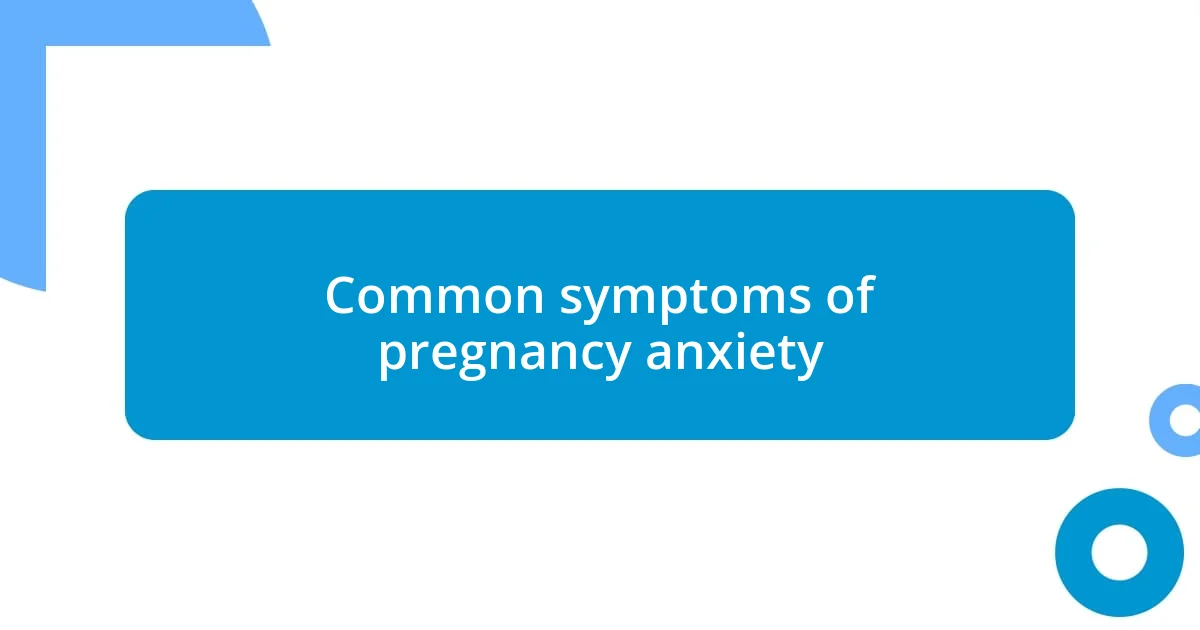
Common symptoms of pregnancy anxiety
The symptoms of pregnancy anxiety can vary greatly among individuals, but they often share common threads. One symptom I experienced myself was persistent worry about the future—questions like “What if something goes wrong?” would swirl in my mind constantly. It’s unsettling when that underlying dread can take away from the joy of impending motherhood.
Physically, anxiety can manifest in ways that are hard to ignore. I remember feeling my heart race, especially during those late-night moments of solitude when I should have been resting. Those small, subtle signs—like trouble sleeping or feeling unusually fatigued—compounded my stress. Recognizing these signals helped me understand that my body was responding to my mental state.
Additionally, social interactions can become challenging during this time. Often, I found myself becoming irritable or wanting to withdraw from friends and family, fearing they wouldn’t quite understand what I was going through. It’s a complex dance of emotions as our minds juggle anxiety, excitement, and the immense life transition ahead.
| Symptom | Description |
|---|---|
| Worry and Fear | Persistent thoughts about potential risks and uncertainties related to pregnancy. |
| Physical Symptoms | Increased heart rate, fatigue, and insomnia that signal anxiety. |
| Social Withdrawal | A desire to avoid social situations due to fear of judgment or misunderstanding. |
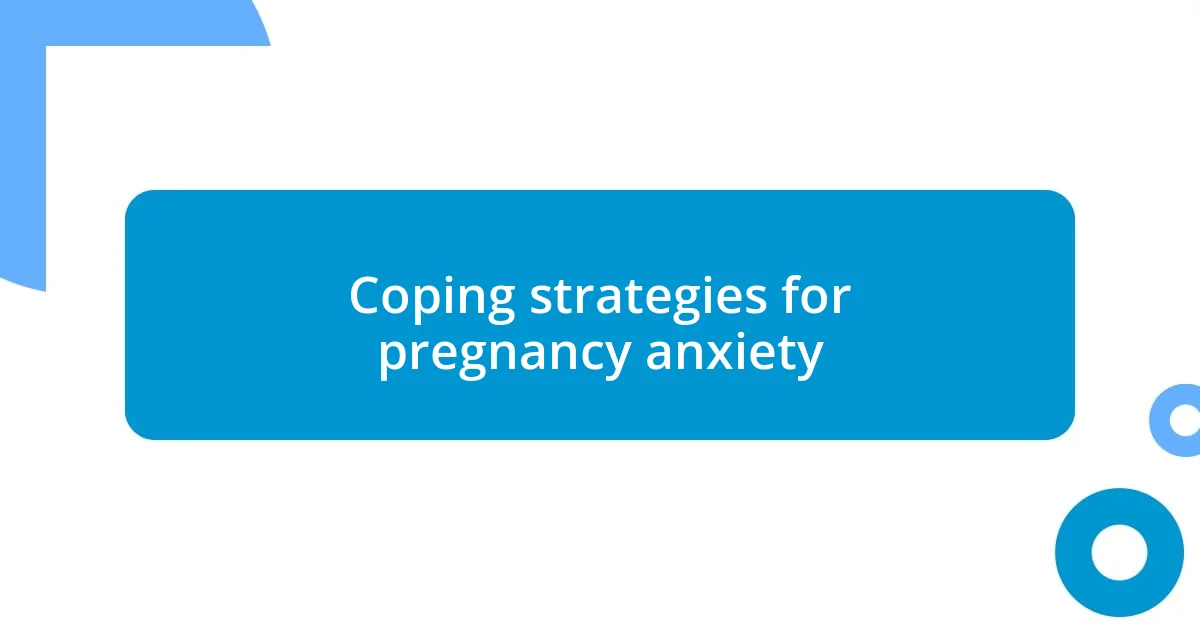
Coping strategies for pregnancy anxiety
Finding effective coping strategies for pregnancy anxiety can truly make a difference in how one navigates the emotional rollercoaster of this time. Personally, I discovered that creativity became my sanctuary; journaling my thoughts and feelings often helped in untangling the chaotic web of worries. I still remember how after writing about my fears, I felt lighter, as if I had released some of the weight I was carrying.
Here are some strategies that might resonate:
- Mindfulness and Meditation: Spending a few minutes each day focused on my breath helped me cultivate a sense of calm that I desperately needed.
- Physical Activity: Walking outdoors not only cleared my mind but also connected me to nature, which was incredibly grounding.
- Support Networks: I reached out to other expecting mothers and found a sense of community that made me feel less isolated in my experiences.
- Professional Help: Talking to a therapist gave me tools to cope with my feelings, something I wish I had sought sooner.
- Education: Learning about pregnancy—what’s normal and what isn’t—provided me with clarity and reduced some of the fear of the unknown.
Connecting with others who share similar experiences can be profoundly reassuring. I remember attending a prenatal class, where hearing fellow mothers express their anxieties made me feel like I was part of something bigger. It was a reminder that while the journey can be daunting, we’re all in this together, and sharing our stories can create bonds that uplift and empower us.
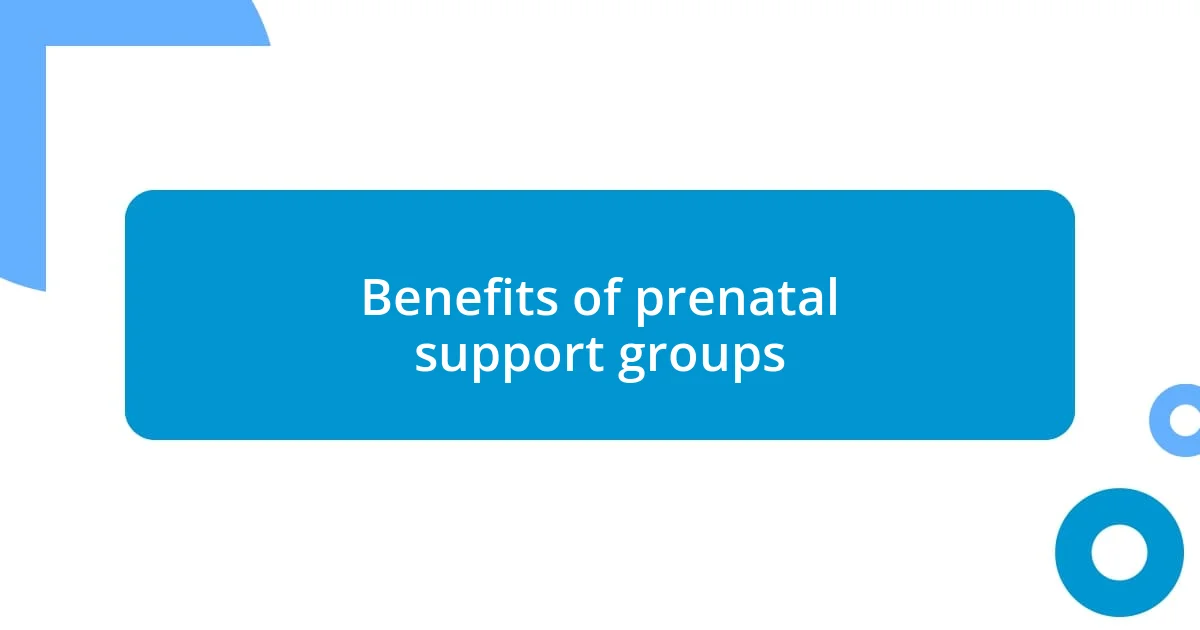
Benefits of prenatal support groups
Engaging with prenatal support groups was a game changer for me. I remember sitting in a circle, surrounded by other expectant moms, sharing our worries and hopes. It was comforting to realize that I wasn’t alone in my feelings. How often do we underestimate the power of simply being heard? When someone understands your worries, it can lift an enormous weight off your shoulders.
The emotional benefits of these groups extend beyond just shared experiences. I often found that talking through my anxieties in a safe space led to new insights and perspectives. For instance, when one mom shared her coping techniques, I found myself inspired to try strategies I hadn’t considered before. This exchange of ideas not only eased my tension but also built a sense of community that made me feel supported and nurtured.
Moreover, the practical knowledge gained from these groups can be incredibly empowering. I vividly recall a session focused on baby care and preparation, which gave me a sense of control amidst the chaos. Armed with new information, I felt less overwhelmed and more capable. Isn’t it reassuring to have a network that not only offers empathy but also equips you with the tools you need? It truly transformed my pregnancy journey into a shared adventure, sparking friendships that continued far beyond our discussions.
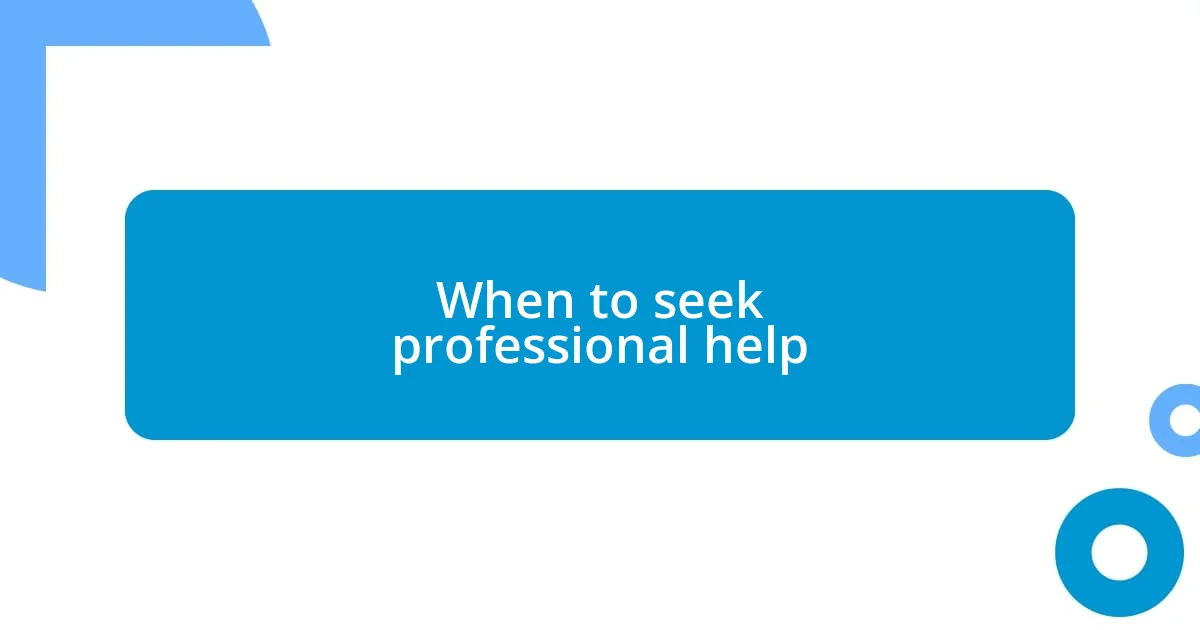
When to seek professional help
Recognizing when to seek professional help can often be the hardest step to take. If your anxiety becomes overwhelming or persistent, it might be time to consult a therapist. I recall a moment when my worries felt insurmountable; it was after a particularly restless night filled with racing thoughts that I realized I needed more than just self-help strategies.
Another sign that professional support may be beneficial is when your daily life begins to suffer. I found myself avoiding social gatherings or feeling paralyzed by fear, which affected my relationships. When your anxiety interferes with the joys of pregnancy—like celebrating milestones or connecting with your partner—it’s essential to reach out for guidance from a mental health professional who understands these unique challenges.
Lastly, if physical symptoms like insomnia, increased heart rate, or panic attacks emerge alongside your anxiety, don’t hesitate to seek help. I remember a time when I felt constant tension in my chest, and it became clear that my coping mechanisms weren’t enough anymore. Identifying these signs early can lead to effective strategies and support, paving the way for a healthier, happier pregnancy experience.
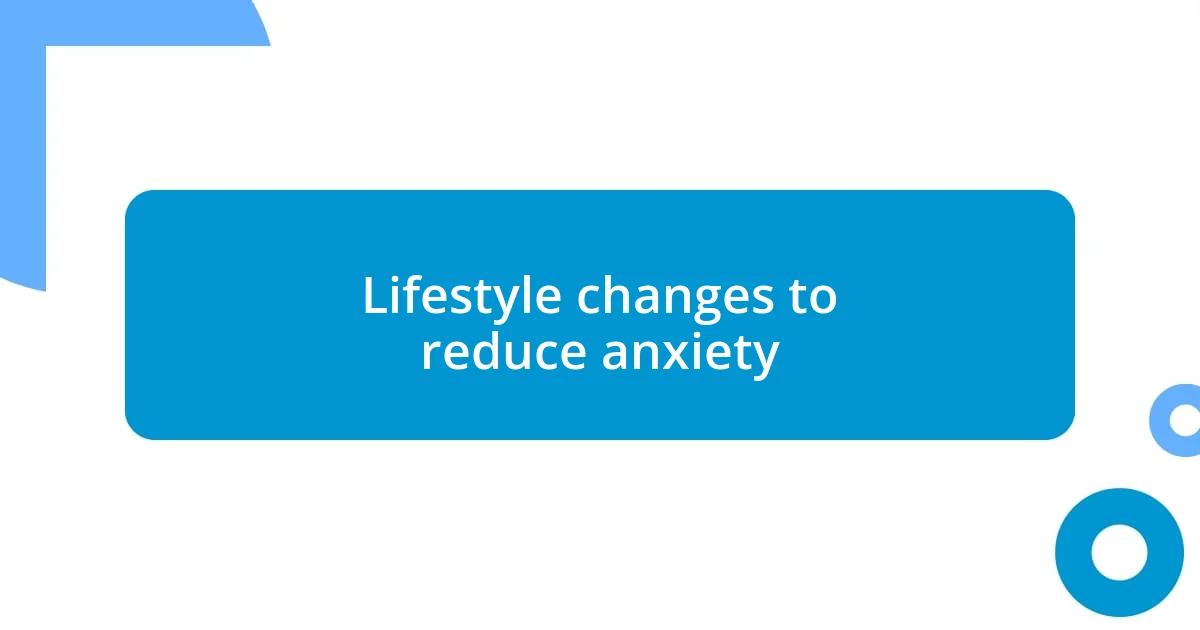
Lifestyle changes to reduce anxiety
Adopting healthier lifestyle habits can significantly help alleviate anxiety during pregnancy. For me, incorporating regular exercise, even just gentle walks, worked wonders. There’s something about that rhythmic movement and fresh air that clears the mind—have you ever noticed how a simple stroll can shift your mood?
In addition to physical activity, I’ve found that mindfulness practices really anchor my thoughts. I started including short meditation sessions into my daily routine. Initially, I wasn’t sure if just sitting quietly could truly make a difference, but it turned out to be a game-changer. You might ask yourself, “Can just a few minutes of stillness really help?” From my experience, it absolutely can, allowing your body to relax and your mind to refocus.
Lastly, prioritizing nutrition played a vital role in my journey. I began to pay attention to what I was eating, opting for whole foods rich in nutrients. Strangely enough, I found that when I fueled my body well, my mental state improved along with it—who knew that a well-balanced meal could ease anxiety too? It’s incredible how lifestyle changes can create a ripple effect, helping you regain a sense of control during such an unpredictable time.












